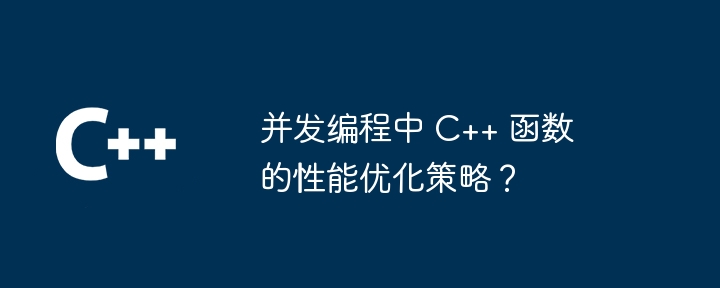Home >Backend Development >C++ >Performance optimization strategies for C++ functions in concurrent programming?
Performance optimization strategies for C++ functions in concurrent programming?
- WBOYWBOYWBOYWBOYWBOYWBOYWBOYWBOYWBOYWBOYWBOYWBOYWBOriginal
- 2024-04-26 21:06:011298browse
Strategies for optimizing the concurrency performance of C functions include: 1. Lock optimization (such as granularity optimization, lock type selection and acquisition order optimization); 2. Data structure selection (such as selecting thread-safe containers, focusing on performance characteristics and memory overhead); 3. Parallelization (such as using threads, task schedulers, and SIMD instructions); 4. Cache optimization (such as declaring local variables, using prefetching, and adjusting cache size).

C function concurrency optimization strategy
In concurrent programming, optimizing function performance is crucial and can improve the throughput of the application. volume and response time. For C functions, the following are some optimization strategies:
1. Lock optimization
Locks are the key mechanism for managing shared resources in concurrent programming. Improper lock usage can lead to deadlocks or performance bottlenecks.
- Granular optimization: Using fine-grained locks can reduce lock contention.
- Lock type selection: Select the appropriate mutex lock type, such as spin lock or atomic operation.
- Optimize the lock acquisition sequence: Define a clear lock acquisition sequence for shared resources to avoid deadlocks.
2. Data structure selection
Selecting the correct concurrent data structure is crucial to optimizing function performance. Consider the following:
-
Synchronization features: Use thread-safe containers such as
std::vectorandstd::map. - Performance characteristics: Choose the data structure that provides the fastest insertion, deletion, or lookup operations.
- Memory Overhead: Consider the memory usage of your data structures, especially if large amounts of data are required.
3. Parallelization
Performance can be improved by parallelizing the processing tasks of the function. Consider the following approach:
- Threads: Create parallel threads to perform tasks.
- Task Scheduler: Use the task scheduler to assign tasks to available threads.
- SIMD instructions: Utilize Single Instruction Stream Multiple Data (SIMD) instructions to perform similar operations in parallel.
4. Cache optimization
Cache optimization can reduce memory access time and improve performance. Consider the following strategy:
- Local variables: Declare frequently used variables as local variables to take advantage of processor cache.
- Prefetch: Use prefetch instructions to load data into the cache in advance.
- Cache sizing: Adjust the cache size to match the access pattern of the function.
Practical case
Optimizing an image processing function
Suppose we have an image processing function process_image(), which performs a series of transformations on the image. To optimize this function, we can take the following steps:
- Lock optimization: Limit concurrent access to image data in a mutex lock.
-
Data structure selection: Use thread-safe container
std::vectorto store image data. - Parallelization: Parallelize image processing tasks using OpenMP.
- Cache Optimization: Optimize access to image data through the use of local variables and prefetch instructions.
By implementing these optimizations, we have significantly improved the performance of the process_image() function, allowing it to process image data faster and more efficiently.
The above is the detailed content of Performance optimization strategies for C++ functions in concurrent programming?. For more information, please follow other related articles on the PHP Chinese website!

